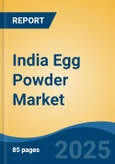Speak directly to the analyst to clarify any post sales queries you may have.
10% Free customizationThis report comes with 10% free customization, enabling you to add data that meets your specific business needs.
Key Market Drivers
Growth of the Processed Food and Bakery Industry
The expansion of India’s processed food and bakery industry plays a crucial role in driving demand for egg powder. With shifting consumer lifestyles and growing preference for convenience foods, there is a notable surge in demand for ingredients with longer shelf life and functional benefits - such as egg powder. The food processing market in India is expected to exceed USD 700 billion by 2030, up from USD 307 billion in 2023. Egg powder is widely used in baked goods like cookies, cakes, and biscuits due to its emulsifying, binding, and foaming properties.It eliminates refrigeration requirements and enables consistent product quality, which is especially beneficial for large-scale food manufacturers and multinational brands seeking standardized ingredients. The rise in demand for high-protein snacks, nutritional bars, and supplements further broadens its application. Urbanization and the shift toward Western eating habits have also contributed to increased usage of egg powder in products such as mayonnaise, dressings, and sauces. As the processed food sector diversifies and innovates, egg powder is expected to maintain a strong position as a staple ingredient.
Key Market Challenges
Limited Domestic Awareness and Low Consumption in India
Despite India being among the top egg producers globally, domestic consumption of egg powder remains limited due to low awareness and preference for fresh shell eggs. In rural and semi-urban areas, traditional food practices dominate, and many consumers are unfamiliar with the concept and benefits of egg powder. Misconceptions regarding its nutritional value and perceived artificiality further hinder its household acceptance.Religious beliefs, vegetarianism, and dietary restrictions also contribute to reduced demand for egg-based products. Moreover, the lack of education around egg powder’s hygienic and storage advantages results in low retail adoption. While commercial users in the food processing and hospitality sectors utilize egg powder, its limited penetration into domestic markets poses a challenge. Heavy reliance on exports increases vulnerability to external market fluctuations and geopolitical factors, which may impact growth stability.
Key Market Trends
Rising Demand from the Health and Nutrition Sector
A notable trend shaping the India egg powder market is its increasing use in the health, wellness, and nutrition industries. As per NFHS-5 (2019-21), around 24% of Indian women and 23% of men are overweight or obese, underscoring a national focus on healthier eating. Egg powder, with its high protein content and low fat profile, is gaining traction among fitness-conscious consumers and athletes. Its application in protein supplements, meal replacement products, and fortified health foods is rising.The growing number of gyms, wellness centers, and functional food brands is accelerating demand for egg-derived ingredients with high digestibility and nutritional value. Egg powder is also used in clinical nutrition products tailored for specific dietary needs in hospitals and elderly care. Post-pandemic interest in immunity-boosting and nutritionally dense foods has further fueled this trend. Food start-ups and established brands are innovating with egg-based functional products to serve health-driven consumer segments, boosting demand across both B2B and B2C markets.
Key Market Players
- SKM EGG Products Exports (India) Limited
- Venkys Group
- Ovobel Foods Limited
- EGGWAY International Asia Private Limited
- GoodWin Conveyor Tex
- Sachit Industries
- Safa Agro Pvt. Ltd.
- VitaeGen Life Sciences
- AgroEgg Pte Ltd
- Egg Domain Pty Ltd
Report Scope:
In this report, the India Egg Powder Market has been segmented into the following categories, in addition to the industry trends which have also been detailed below:India Egg Powder Market, By Product Type:
- Whole Egg Powder
- Yolk Egg Powder
- White Egg Powder
India Egg Powder Market, By End Use:
- Food & Beverages
- Personal Care & Cosmetics
- Nutraceuticals & Pharma
- Animal Feed & Pet Food
India Egg Powder Market, By Distribution Channel:
- Supermarkets/Hypermarkets
- Departmental Stores
- Online
- Others
India Egg Powder Market, By Region:
- North
- South
- East
- West
Competitive Landscape
Company Profiles: Detailed analysis of the major companies present in the India Egg Powder Market.Available Customizations:
With the given market data, the publisher offers customizations according to a company's specific needs. The following customization options are available for the report.Company Information
- Detailed analysis and profiling of additional market players (up to five).
This product will be delivered within 1-3 business days.
Table of Contents
Companies Mentioned
- SKM EGG Products Exports (India) Limited
- Venkys Group
- Ovobel Foods Limited
- EGGWAY International Asia Private Limited
- GoodWin Conveyor Tex
- Sachit Industries
- SAFA AGRO Pvt. Ltd.
- VitaeGen Life Sciences
- AgroEgg Pte Ltd
- Egg Domain Pty Ltd
Table Information
| Report Attribute | Details |
|---|---|
| No. of Pages | 85 |
| Published | July 2025 |
| Forecast Period | 2025 - 2031 |
| Estimated Market Value ( USD | $ 50.72 Million |
| Forecasted Market Value ( USD | $ 64.79 Million |
| Compound Annual Growth Rate | 4.1% |
| Regions Covered | India |
| No. of Companies Mentioned | 10 |









